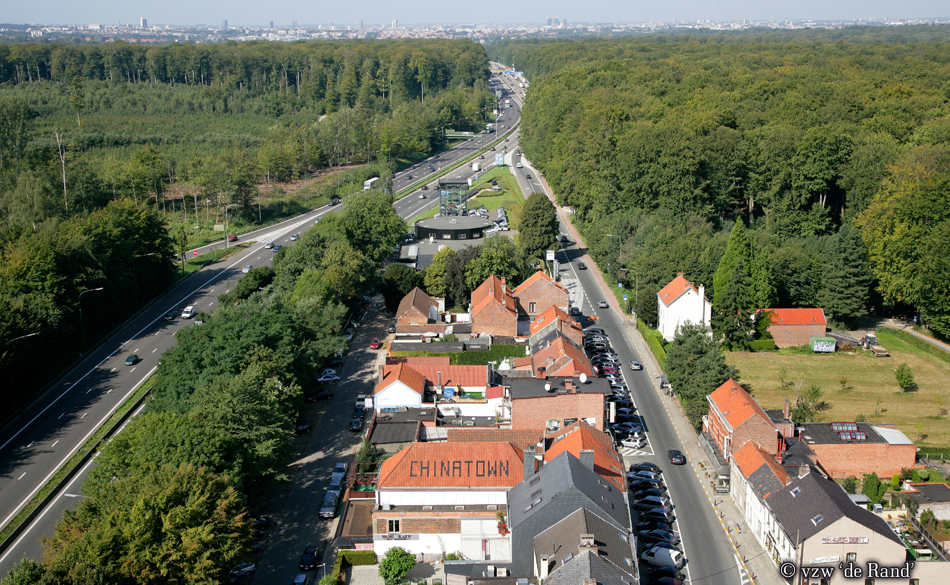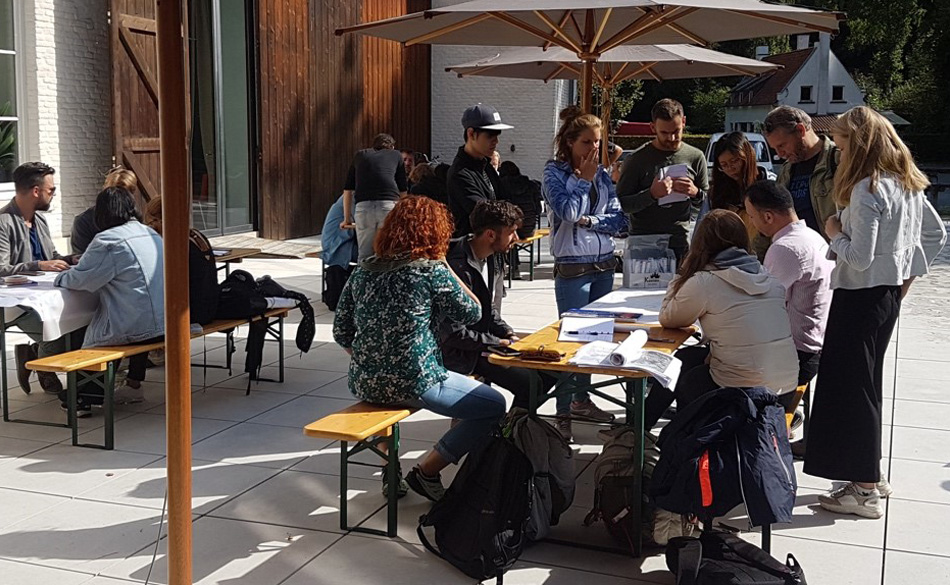Overview
Urban design research is a means to understand the most pressing challenges in the contemporary built environment. Flanders’ legacy of urban history and its present-day land consumptive tendencies stress natural resources and are an ecological crisis in the making. The consequences of climate change are exacerbating threats. There is the urgent necessity to significantly overhaul the modes, morphologies and typologies of settling. Context-embedded urban design and its interplay with visionary environmental planning is necessary to address the precarious stage of development humanity and nature now find themselves. The Belgian field school in urban design and environmental planning is grounded in the belief in both state-of-the-art design thinking and practices (including innovation from the disciplines of engineering, transportation, and ecology) and local intelligence of places as expressed in specific appropriation of techniques and relation to socio-cultural practices.
The students will be taught a series of fieldwork methods that are tailored to the local context and which will allow for a deeper understanding of both larger landscape systems and their appropriation by local inhabitants for living and working. Drawing, as is a habit in the design professions, will be a method of synthesis for the fieldwork and design thinking will be complemented with lectures which highlight relevant case studies. Feedback and interaction with local experts and stakeholders will ground both the fieldwork and future scenarios and the design of new morphologies and typologies in the context. Besides the techniques that participants will be made acquainted with, the learning-by-doing approach of the field school will give the participants a unique experience of practicing urban design and environmental planning in a “living lab”, where interdisciplinary inputs are combined with extensive exchanges with stakeholders of various kinds, ranging from local communities until high ranking government officials and everything in between.
Instructors
The directors welcome emails and inquiries about the research elements of this project. More general information (tuition, health insurance, and payment schedule) can be found under the ‘Students’ tab above. Any further questions may be addressed to IFR staff. Additional details about research, course schedule, travel, accommodation, and safety can be found on the syllabus. Contacting the directors or the IFR office is encouraged and appreciated. It may help you determine if this field school is a good fit for you.
Testimonials
This is a new IFR field school. No student testimonials are available at this time.
Tuition Includes:
- Cost of Instruction
- Cost of Academic Credit Units
- Room & Board
- All local transportation
- Health & Evacuation Insurance
Student Fees
This program requires an online application — there is no fee to submit an application. Once admitted, a payment of the nonrefundable deposit fee is required to secure a place in the program(s). The Tuition balance (total program cost minus the deposit fee) must be paid prior to the Tuition deadline as listed above under “Course Details.” A $200 late fee will be added to all accounts not paid in full by the Tuition deadline.
Early Decision Enrollment (Nov 1, 2019 through Jan 10, 2020): A reduced, nonrefundable $300 deposit fee is required to secure a seat in the program. This deposit is part of the total Tuition and NOT in addition to it.
Regular Enrollment (Jan 11, 2020 through payment deadline): A nonrefundable $500 deposit fee is required to secure a seat in the program. This deposit is part of the total Tuition and NOT in addition to it.
Late Enrollment (payment deadline forward): A nonrefundable $600 deposit fee is required to secure a seat in the program. In addition, a $200 late fee will be added to all accounts not paid in full by the Tuition payment deadline.
Withdrawal & Cancellation Policy: If you paid the deposit fee but did not cancel your participation by the Tuition payment deadline, you are legally responsible for the full Tuition regardless of attendance at any IFR program. Please carefully read our Withdrawal & Cancellation Policy for further information.
Credit Card Processing Fee: A 2.5% processing fee is automatically incurred for all credit/debit card/online payments.
Academic Credit Opt Out: Students who wish to participate in an IFR field school without earning academic credit units may do so and receive the following discounts: $300 off a full program (4 or more weeks in length) or $200 off a short program (2-3 weeks in length).
Trip Cancellation Insurance: The IFR does not provide trip cancellation insurance. Read this Wall Street Journal article about travel insurance — it may help in making a decision whether such insurance is for you. If you do wish to purchase such insurance, Insure My Trip or Travel Guard are two possible resources you may wish to explore.
Accommodations
There will be two sites of accommodation: 1) in the surroundings of the Sonian forest: a youth hostel for six nights; 2) in Leuven: in single-occupancy dorms rooms (with shared bathrooms and toilets) of the KU Leuven. During the days in the forest, the youth hostel will be responsible for our food: they are used to hosting national and international guests. In Leuven, breakfast can be prepared in the shared kitchen of the dorm. For lunch we will organize sandwiches and for dinner students will have a meal plan with the university.


Travel Info
We suggest you hold purchasing your airline ticket until six (6) weeks prior to departure date. Natural disasters, political changes, weather conditions and a range of other factors may require the cancelation of a field school. The IFR typically takes a close look at local conditions 6-7 weeks prior to program beginning and make Go/No Go decisions by then. Such time frame still allows the purchase deeply discounted airline tickets while protecting students from potential loss if airline ticket costs if we decide to cancel a program.
We will meet participants at the “Le Beauty GastroPub” (147 Groenendaalstraat, Hoeilaart 1560, Belgium)just across from the Groenendaal Train Station at 4pm on July 5thand provide transport by mini-van to the youth hostel. If you missed your connection or your flight is delayed, please call, text or email project director immediately. A local emergency cell phone number will be provided to all enrolled students.
VISA REQUIREMENTS
Students are responsible for obtaining a Belgian VISITOR Visa prior to arrival. This can most easily be done online (https://unitedstates.diplomatie.belgium.be/en/visa-belgium/visitors). Please note that you must have a US Passport issued within the last 10 years and with validity that exceeds the intended stay of the applicant by at least three months. Please make sure that your passport has at least two blank pages facing each other where visa and stamps may be affixed.
Citizens of other countries are asked to check the embassy website page at their home country for specific visa requirements.
Student Safety
The IFR primary concern is with education. Traveling and conducting field research involve risk. Students interested in participating in IFR programs must weigh whether the potential risk is worth the value of education provided. While risk is inherent in everything we do, we do not take risk lightly. The IFR engages in intensive review of each field school location prior to approval. Once a program is accepted, the IFR reviews each program annually to make sure it complies with all our standards and policies, including student safety.
Students attending IFR international programs are covered by a comprehensive Health Insurance policy that includes physical illness or injury, mental or chronic conditions. No deductible and 100% of costs are covered up to $250,000. In addition, we provide Political and Natural Disaster Evacuation policy, which allow us to remove students from field school location if local conditions change. Our field school directors are scholars that know field school locations and cultures well and are plugged in into local communities and state institution structures.
Students attending IFR domestic programs (within the US) must have their own health insurance and provide proof upon enrollment. IFR field school directors are familiar with local authorities and if in need of evacuation, local emergency services and/or law enforcement will be notified and activated.
The IFR has strong, explicit and robust policy towards discrimination and harassment in the field. If students feel they cannot discuss personal safety issues with field school staff, the IFR operates an emergency hotline where students may contact IFR personnel directly.
Call us at 877-839-4374 or email us at info@ifrglobal.org if you have questions about the safety of any particular program.






